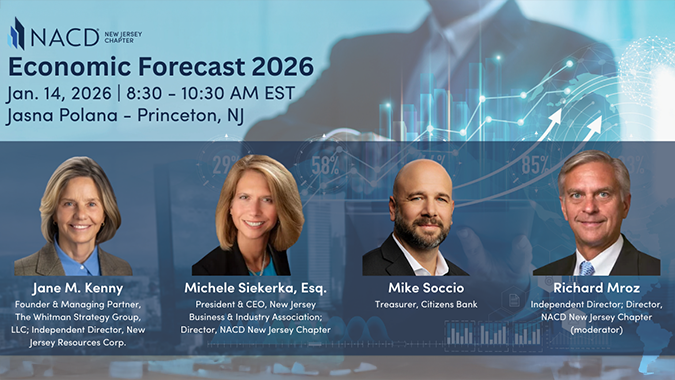On behalf of our member companies that make NJBIA the largest business association in our state, thank you to Chairwoman Cruz-Perez for giving business organizations this important opportunity to speak about how we can improve our state’s economic recovery after the pandemic, as well as for the chance to comment on the alarming results of the recent state procurement disparity study.
As this committee will hear at length about the disparity study, NJBIA will focus our comments to this committee on growing our economy more generally. That being said, it is important for this committee to hear that NJBIA believes that lifting up our diverse businesses lifts up all of our businesses, and towards that, we are excited to be part of the new New Jersey Diverse Business Advisory Council. In general, NJBIA believes that better data is one of the best ways to support diverse businesses, and we also know that our regulatory burdens have an outsized burden on our smaller businesses, so therefore easing our regulatory environment supports our diverse businesses.
NJBIA views our economic landscape through five factors that have only grown in importance since the pandemic. Hopefully, it can be helpful to organize the economic growth agenda of this Senate Economic Growth Committee through these policy areas:
- Three Opportunities That Need Investment
- Workforce Development
- Innovation/Manufacturing
- Infrastructure
- Two Burdens That Need to Be Balanced/Moderated
- High Costs/Taxes
- Regulatory Burdens
Jobs and capital are fluid and mobile and move to states that support their creation and growth. If New Jersey can set a course to improve our state investments in our workforce, our innovation eco-system and our infrastructure that supports the economy while striving to control the excessive costs and regulatory burdens that make us less attractive to capital and economic growth, we can better compete with other states. We can then reclaim New Jersey’s rightful place as an economic leader among the states instead of the more recent economic laggard.
New Jersey currently has the third worst unemployment rate among our 50 states, and we ranked in the middle of the states in the most recent quarter for our growth in state GDP. In the five previous quarters, New Jersey has only surpassed the national average growth once. Also troubling is that our labor force, which grew after the initial declines from the pandemic and into early 2023, has now consistently declined through the second half of 2023. Our New Jersey economy is not recovering as well as we would all like.
Three Opportunities That Need Investment
- Workforce Development – To grow the economy, New Jersey needs to do more to invest in a strategic way in our most valuable resource, our workers. The NJ Pathways to Career Opportunities program managed by our community colleges and recently funded in State Budgets by the Legislature and Governor is a good example of a successful workforce development investment, but we need more. There is a need to make a significant investment to address the severe healthcare workforce shortage beyond the start in the proposed budget or supporting the childcare industry that underpins the entire workforce. We also must better align the needs of the economy to the significant investments we already make in the workforce development pipeline, including pre-school, K-12, higher education, private career schools, training programs and apprenticeships. New Jersey needs to prioritize these win-win investments that support both employees and employers.
Lastly for our workforce, it is critical for New Jersey to find the right balance with the shift to remote work that has become prevalent in the labor market. We must embrace this shift and make policies that support it, and the employees and employers that use it. At the same time, we need to better invest in our downtowns that see less foot traffic as a result of it.
- Innovation/Manufacturing – To grow the economy, New Jersey needs industries with multiplier effects on our economy, and that is where supporting innovation and manufacturing matters. New industries that have more growth potential, require higher technical skills, support other industries and have higher wages and benefits are our future. Innovation and manufacturing are those industries. New Jersey’s recent support of green energy/wind, film, cannabis, fintech, advanced manufacturing and AI all could have a multiplier effect on the rest of the economy. But we need to expand our support for innovation to be a national leader in it.
Examples of where we could do this but could come up short are the EDA’s recent testimony about the Federal CHIPS Act to the Legislature’s Manufacturing Caucus and Governor Murphy’s recent call for an AI Moonshot. NJBIA would be ecstatic to support making a significant investment in either, but the proposed state budget includes only $7 million for new AI programs and no new CHIPS investments. We need to support innovative start-ups, encourage manufacturers investing in expensive capital equipment, expand the Angel Investor program, support the great work of NJMEP and have a comprehensive Innovation Roadmap for our state to be an innovation leader.
- Infrastructure – To grow the economy, New Jersey needs to build things. Similar to workforce development, this is a win-win policy for employees and employers - creating jobs and leaving a lasting legacy of resources that the overall economy can use for generations to come. New Jersey has led for decades on investing in transportation infrastructure, but that must be continued with a new Transportation Trust Fund re-authorization and a dedication to NJ TRANSIT that does not require a tax increase on an already overtaxed state. Infrastructure investments also include such things as modernizing water infrastructure, upgrading the electric grid and better broadband capacity - all investments we want to see that create good construction jobs now and create a better playing field for New Jersey businesses to ensure all kinds of economic growth in the future.
Two Burdens That Need to Be Balanced/Moderated
- High Costs/Taxes – It is hard to argue any differently that New Jersey is too expensive, and when businesses know it is easier to make a profit in other states, investors know that they get more bang for their buck elsewhere and businesses competing nationally must have higher price in their contract bids, those costs matter. Those costs come from our unrelenting tax climate with every major tax in New Jersey towards the top of state rankings, and those costs also come from our general high costs of living and doing business. The Legislature and Governor should avoid increasing those taxes or costs as much as possible to help our businesses compete. Non-tax expenses such as housing, wages, insurance costs and healthcare are high in New Jersey but less easy for state government to dictate, while our state taxes are a policy choice. NJBIA asks you to choose restraint. Currently, Governor Murphy’s proposed $1 billion corporate business tax increase hurts our competitiveness with a massive 20% increase while Pennsylvania is on a path to cut theirs in half. Additionally, the proposed tax on New Jersey’s critical logistics industry also harms economic growth. If we want to grow our economy which is what this hearing and this committee is about, the Legislature should oppose both. Lastly on taxes, we ask the Legislature to explore our excessive government spending that make some policymakers wildly believe we need to have the highest taxes in the nation to support that.
- Regulatory Burdens – NJBIA calls for balance and moderation when it comes to our regulatory burdens, but currently we lack that middle –ground, putting more obstacles in front of our businesses than in other states. New Jersey consistently seeks out labor and environmental/energy mandates that exceed what most and sometimes all states impose. Examples of this are the paid family leave mandate that recently passed the Assembly and we hope the Senate continues to not move, and the impossible clean energy mandates that are in legislation regularly heard by the Senate Environment Committee like today. Governor Murphy’s 100% electric vehicle mandate is another completely unrealistic policy that will impose costs and burdens on our economy. New Jersey even imposes professional licensing burdens on our workforce with massive delays just to get to work in areas that have workforce shortages.
Conclusion
There are reasons our economy is not performing as well as we all want, and I think examining where we are in all five of these factors can help address that. We all know that it is not helpful for economic growth to have the highest taxes and costs or the most burdensome regulations in the nation. We also know that it cannot be helpful to our ability to create and attract jobs for us to invest less in our workforce, our innovation and manufacturing ecosystems and our infrastructure than other states. New Jersey needs a plan to strengthen what we are good at, improve where we are weaker than we want to be and attract the kind of growth we all want.
Thank you for considering NJBIA’s perspective on our state economy, and as always, we hope to be a resource for you and look forward to collaborating with this committee and our entire State Legislature to effectuate what we talked about today.


